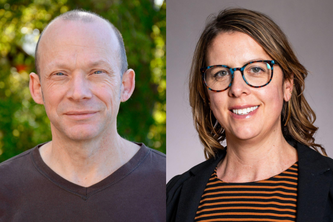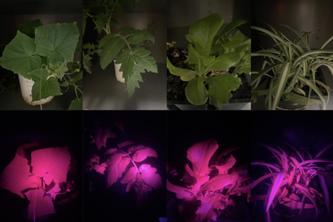
Student-run impact ventures focused on providing clean water through micro-entrepreneurs and bringing fashion and healing together to empower and employ Native Americans have been selected Gold Level winners of the 2016 Acara Challenge, a competition held by the University of Minnesota’s Institute on the Environment in partnership with the College of Science and Engineering and the Carlson School of Management. The top-level teams and other awardees will have the opportunity and resources to further develop their innovative business solutions for environmental and social challenges.
The challenge was divided into a domestic and an international division, each with gold, silver and bronze levels. Gold Level winners receive $1,000 toward pilot expenses. Silver Level honorees receive $750 and Bronze Level recipients get $500. Select ventures are also invited to receive up to $5,000 in additional funding for Acara Fellowships to pilot their idea. In addition this year, Acara is working with D-Prize, which will match Acara fellowship awards for selected teams that expand access to poverty-alleviation solutions in the developing world. This new partnership enables Acara to offer up to $10,000 in fellowship funding for up to four teams from the International Division.
Students from the 2016 Acara Challenge will join a new leadership development program funded by the C. Charles Jackson Foundation. This program will engage the Acara fellows in ongoing coaching, workshops and reviews from May to September 2016.
“Students today are passionate about creating positive impact in the world, and we are happy to recognize the best of these students in the Acara Challenge,” said Acara director Fred Rose of the Institute on the Environment. “We are deeply grateful to our generous donors and partners that allow us to incubate the winning students over the coming year as they develop their venture plans into operational social enterprises, generating revenue and impact in Minnesota and abroad.”
“The pedagogical innovations of the Acara program continue to unleash the creativity and passion of young people across the University and across the globe,” said Lewis Gilbert, Institute on the Environment COO. “The IonE is very proud to count it among our solutions-oriented programs.”
The Acara Challenge, which began in 2009, spurs start-ups with creative, sustainable solutions that can have an impact in the real world.
The 2016 Acara Challenge winners are:
Domestic Division
Gold
Siobhan Powers
This high-end Native American fashion house allows consumers to represent Native American success and contribute to empowering Native American designers to end cultural appropriation of Native American culture in fashion, provide employment to Native American felons, and promote healing and self-expression through art. Patricia Columbus-Powers, Carlson School of Management
Silver
Minnesota Freedom Fund*
Minnesota Freedom Fund pays bail for low-income individuals and connects them with legal support, helping them reconnect with their jobs, homes and families. It seeks to cast light on inequities in the legal system and ensure that no one is stuck in jail for the crime of being poor. Simon Cecil, Carlson School of Management and Humphrey School of Public Affairs; Adam Rao, Carlson School of Management *Crowd Favorite – Domestic Division
Bronze
Let’s Grow
Let’s Grow uses a simple, recently developed hydroponic system that allows growers to plant and forget their fresh vegetables, until they are ready to be eaten. Henry Croll, College of Science and Engineering
International Division
Gold
Pure Paani
Pure Paani provides portable, hand-operated water filtration devices to a network of micro-entrepreneurs living in communities in which potable water access is minimal. Christopher Bulkley-Logston, College of Science and Engineering; Kaylea Brase, College of Science and Engineering
Silver
SMS Maama
SMA Maama is a text messaging service for pregnant women in Uganda. Women receive informational and interactive screening texts and are connected with a midwife should follow-up be indicated. Sonja Ausen-Anifrani, School of Public Health; Katelyn Pastick, College of Biological Sciences; Meg Burman, School of Nursing
Bronze
Mobineo
Currently, nearly all land claims in the developing world are in paper, which is incredibly hard to track and manage. Mobineo is a software company that has developed surveying equipment that is more precise, secure and intuitive than existing paper solutions. Kate Kuehl, College of Food, Agricultural and Natural Resource Sciences; Kevin Thomsen, College of Science and Engineering; Dave Okech, Kenya Business Lead; and Jack O’Leary, College of Science and Engineering
MobiLite*
MobiLite is an affordable and portable light and energy system that enables additional cellphone functionality for urban slum residents in India. Kristin Carlson, College of Science and Engineering; Luke Horsager, College of Science and Engineering; Rachel Sobel, College of Biological Sciences and College of Science and Engineering; Will Kraft, Carlson School of Management *Crowd Favorite – International Division
Health Sync
Health Sync will distribute remote health monitoring stations to rural villages in India to help gather data for rural health professionals and urban health centers that are trying to address the lack of healthcare access in these areas. Viswa Challa, College of Liberal Arts; Raj Kumar, Medical School; Andreas Hochrein, College of Liberal Arts; Raoul Fernandes, College of Liberal Arts
The University of Minnesota’s Institute on the Environment seeks lasting solutions to Earth's biggest challenges through research, partnerships and leadership development. For more information on IonE, visit environment.umn.edu. For more information on Acara, see acara.environment.umn.edu.
- Categories:
- Agriculture and Environment





